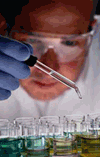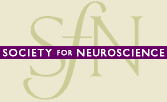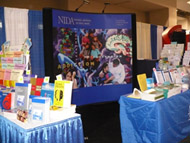
|

|
|
What's New at the National Institute on Drug Abuse  In the first study to measure the prevalence of cannabis use disorders (CUD) among young adults attending college, researchers funded by NIDA found that in a group of students who had used cannabis 5 or more times in the past year, 1 in 10 met the clinical Diagnostic and Statistical Manual of Mental Disorders (DSM)-IV definition for cannabis dependence, and 14.5 percent met the definition for cannabis abuse.
Additional Research News Stories
News Releases  As many as three scientists will receive up to $500,000 each year for five years for potentially groundbreaking approaches to the prevention and treatment of HIV/AIDS in drug abusers. The National Institute on Drug Abuse (NIDA), a component of the National Institutes of Health (NIH), created the Avant-Garde Award to stimulate high-impact research into the link between drug abuse and HIV/AIDS. NIDA is now accepting submissions for its 2009 Avant-Garde awards program. The Avant-Garde Awards are modeled after the NIH Pioneer Awards, which are granted to scientists of exceptional creativity who propose pioneering, and possibly transformative, approaches to major challenges in biomedical behavioral research
NIDA Study Reveals Dopamine Receptors' Surprising Flexibility Additional News Releases
NIDA Chat Day Makes National News  NIDA staff participates in 2nd Annual Chat Day October 7th marked NIDA's second annual Drug Facts Chat Day. More than 30 NIDA researchers and science writers answered a record total of 1,300 questions close to 100 schools nationwide. Although NIDA limited the number of schools that could participate this year, we still received 11,000 questions, underscoring how much teens (and their teachers) want to learn real facts about drug use. For the first time the event was covered by the Associated Press (AP). AP Reporter Kevin Freking, along with an AP video crew, attended the event at both Chat Day headquarters and at Rockville High School to glean perspectives from both sides of the computer.  NIDA's Dr. Nora Volkow and Dr. Joe Frascella were interviewed for the story, which was published in more than 20 print and online publications including The Washington Post, The Los Angeles Times, EducationWeek and CBSNews.com. Congratulations to all who made this year's CHAT DAY such a big success. Interviews The Los Angeles Times interviewed Dr. Nora Volkow about prescription drug abuse among youth. The story was published in print on October 28.
Dr. Volkow was interviewed by the Lancet for a November 5 article on drug abuse among older adults.
Marie Claire magazine interviewed Dr. Volkow for an article on cognitive enhancers (aka "smart drugs"), which appeared on news stands November 24.
The Los Angeles Times also ran an article November 10 entitled, "At Addiction Centers, Longer Treatment Programs Are Proving Key to Ending the Relapse-Rehab Cycle." NIDA's Dr. Lisa Onken was interviewed for the story.The story was re-printed in the Washington Post on November 25.
Publications & Website News NIDA launched its new Research Dissemination Center (DrugPubs) in late September, designed to distribute the latest scientific materials and information on drug abuse and addiction to virtually all audiences: drug abuse researchers, health professionals, teachers, advocacy groups, teenagers and the general public. In its first month, NIDA DrugPubs sent out 145,000 NIDA publications! Callers to 1-877-NIDA-NIH or visitors to www.drugabuse.gov can receive scientific information on drug abuse in a timely and effective manner. DrugPubs will distribute a wide range of free or low-cost materials including fact sheets, brochures, pamphlets, posters, and video tapes, on a variety of drug abuse topics. NIDA formerly distributed its research information and science education materials via the Substance Abuse and Mental Health Services Administration National Clearinghouse for Alcohol and Drug Information (NCADI). Callers to the NCADI clearinghouse who are requesting information relating to the science of drug abuse and addiction will now be referred to the new DrugPubs phone number and the NIDA website. For more information about DrugPubs and how the new service works, contact Brian Marquis. NIDA a Key Player at Neuroscience 2008 NIDA and four other NIH institutes held a media roundtable for journalists during Neuroscience 2008, the Society for Neuroscience annual meeting. Dr. Nora Volkow spoke first before a packed room, highlighting the latest findings in addiction science. She was followed by Dr. Thomas Insel, Director of the National Institute of Mental Health, Dr. Story Landis, Director of the National Institute of Neurological Disorders and Stroke, Dr. Paul Sieving, Director of the National Eye Institute, Dr. Marcelle Morrison-Bogorad, Division of Neuroscience Director at the National Institute on Aging, and Dr. Christopher Platt, Hearing and Balance Program Director of the National Institute on Deafness and Other Communication Disorders. The speakers discussed success stories and new directions in neuroscience research, and journalists were presented with a rare opportunity to meet and interact with several NIH directors at once. NIDA scientists were in high attendance at the five-day meeting, many presenting their research during NIDA's mini-convention, "Frontiers in Addiction Research." Highlights of the mini-convention were symposia on willpower, epigenetics and brain function, multimodal imaging of neuropathways, and cortical development and substance abuse. NIDA-sponsored mini-symposia at the conference included panels on epigenetics in the nervous system and neuroimaging evidence in drug addiction. NIDA representatives were also available at the NIDA Exhibit Booth to discuss NIDA's research funding opportunities. NIDA News Now Delivered Through RSS 
NIDA press releases and NewsScans are now available through RSS feeds. RSS, short for "Really Simple Syndication," is an easy way to keep up with news and information, and helps avoid the conventional methods of browsing or searching for information on websites. Each time NIDA issues a press release or publishes a NewsScan, the content can now be delivered directly to your inbox. To sign up for the RSS service, go to: The NIDA Networking Project (NNP)  NIDA's new NNP website encourages drug abuse researchers, practitioners, and policy makers to share information across disciplines, networks and institutions. The one-stop portal provides access to the locations, people, and resources of NIDA-sponsored research networks, including, for example, the National Drug Abuse Treatment Clinical Trials Network (CTN) and the NIDA Genetics Consortium (NGC). The goal is to encourage cooperative scientific discussion and research collaboration to accelerate addiction science. The NNP website includes:
For more information on the NNP website, please contact: Susan David, NNP Coordinator, at 301-435-0640.
Other News NIDA's "After the Party" bilingual television PSA received an Emmy Award nomination on October 1, 2008 in the National Public Service category. NIDA was the only Federal agency in this year's competition. The other nominees included ThinkMTV.com, the American Cancer Society, and the Kaiser Family Foundation in partnership with HBO, the NBA and the Global Business Coalition. The PSA, targeted to a Hispanic audience, is designed to educate teens on the link between non-injection drug use, risky behaviors, and HIV transmission. The Annual Public and Community Service Emmy Awards honor television professionals and non-profit groups for programming that advances the common good. |
|




